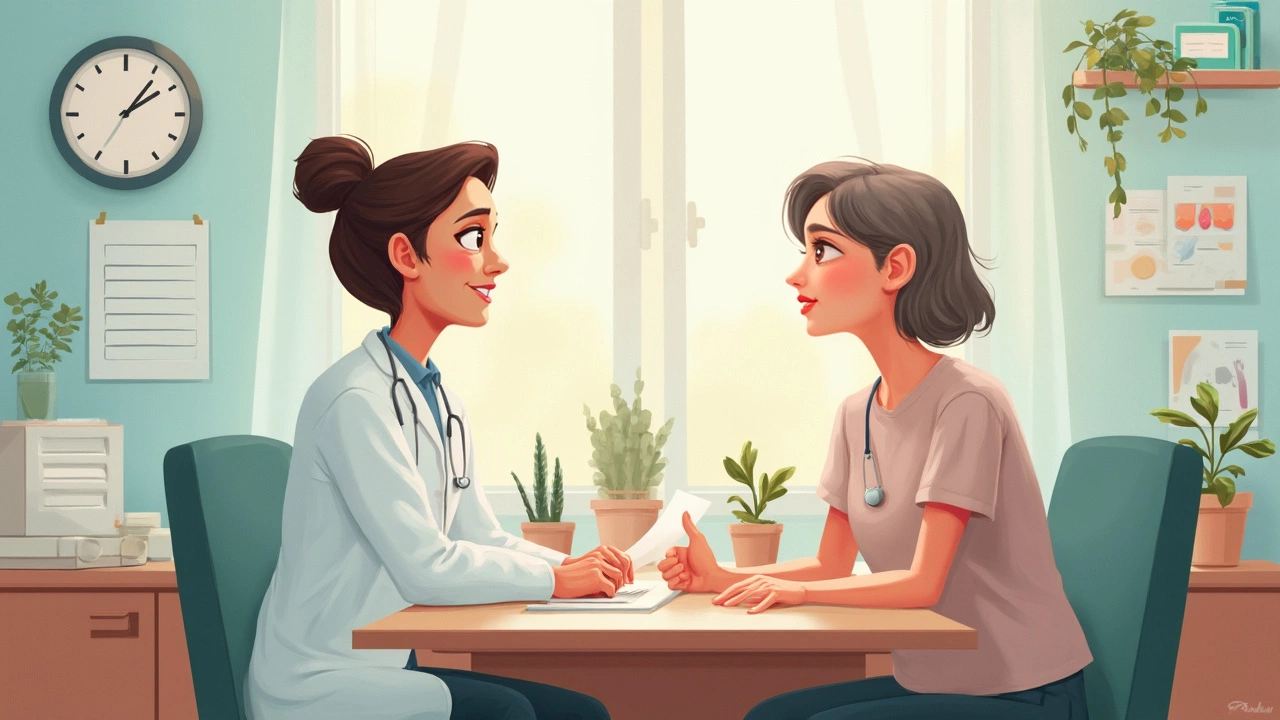
Have you ever sat in a waiting room, glancing at the clock, and wondered exactly how much face time you're about to get with your GP? In most practices around the UK, the average appointment is 10 minutes. That’s shorter than a TV commercial break or waiting for your kettle to boil. And yet, so much can happen during those few minutes, from quick check-ups to big life-changing conversations.
If you're thinking 10 minutes doesn’t sound like much, you’re not alone. Lots of people feel rushed or worry they won’t get to mention everything. Here’s a tip: write down your issues before you go. Prioritize what’s most urgent. It keeps things focused and ensures you don’t forget that detail you thought of in the shower and promptly lost two minutes later.
Now, not every session clocks in right at 10 minutes. Some can be longer—especially for complex problems, mental health, or if your doctor wants to run small procedures on the spot. And for children or older adults, GPs often allow a little extra time. Booking a double appointment is sometimes an option if you know you’ll need more time, but you usually need to ask for it specifically when you call.
- Average GP Session Length
- Why Appointment Times Vary
- How to Make the Most of Your GP Visit
- Quick Tips: Booking and Timing
Average GP Session Length
If you book a gp session these days, especially if you’re searching for a "gp near me," you can almost always expect your appointment to be set for 10 minutes. This has become the UK standard in NHS general practices for a single patient with a single issue. It sounds short because it is. GPs are juggling packed schedules—one recent survey found that a typical doctor can see upwards of 30 patients a day, so keeping things moving is the norm.
Still, the reality isn't always as rigid as the booking system says. If you show up with a simple cough, a repeat prescription, or you need your blood pressure checked, you’ll probably be in and out well under the time limit. If you bring more than one concern, or if the issue is complicated, the doctor might either run over by a few minutes or ask you to book another appointment.
Check out this quick rundown of average appointment lengths from one UK study published in 2023:
| Type of Appointment | Average Length (minutes) |
|---|---|
| Standard GP Session | 10 |
| Mental Health Discussion | 18 |
| Annual Health Review | 15 |
| Follow-up Visit | 7 |
Why does it matter? For one, it helps if you calibrate your expectations. You can get quite a bit done in 10 minutes if you’re prepped (I always jot down a list for Oscar and myself, because it’s surprisingly easy to forget once you’re in the chair). But if you have a chunkier concern—like ongoing mental health problems, or if you need multiple issues looked at—think about asking the receptionist for a double appointment upfront.
The system isn’t perfect, but knowing roughly how long you’ve got helps you make every minute count.
Why Appointment Times Vary
You might notice your gp session length isn’t always the same each visit. It’s not random—several things can stretch or shrink that short window with your doctor. The most obvious one? The reason for your appointment. If you come in for a repeat prescription or a straightforward concern, expect it to be wrapped up quickly, probably right around ten minutes. But if you’re dealing with several symptoms at once, your GP might run just a bit over, especially if something needs checking right there and then.
Some surgeries or clinics run slightly longer gp appointments as a rule, especially for things like mental health discussions, elderly patients, or young children’s visits. But in most places, the regular slot is still about ten minutes. And here’s the tricky bit—even simple appointments can get delayed if earlier sessions run late, especially when emergencies or tough diagnoses pop up.
The system is tight, partly because GPs are seeing more patients than ever. According to NHS data from late 2024, more than 30 million appointments were booked with GPs each month. That crunch is one big reason why standard times are short and why delays sneak into even the best-planned days.
Here’s a look at what commonly affects your doctor consultation time:
- If you’re a new patient (extra info gathering needed)
- If you have more than one problem to discuss
- The complexity or sensitivity of your issue (mental health, chronic conditions, test results)
- Whether it’s a face-to-face or phone/video appointment (remote ones are often quicker)
- If your GP is running behind due to earlier emergencies or technical hiccups in the practice
So if you’re searching for a gp near me and hearing mixed stories about how long things take, this is the real picture: standard times are short, but situations and needs shape what happens on the day. And honestly, sometimes you leave thinking, “Wow, I was in and out in five,” while other days you wish you’d brought a snack for the waiting room.

How to Make the Most of Your GP Visit
When you’re walking into a GP session, the clock pretty much starts ticking the moment you sit down. So, a little bit of prep can seriously pay off. Most people get only about 10 minutes, and according to NHS Digital, over 90% of appointments still last no longer than that. Here’s how to squeeze the most value out of every second.
- Write a bullet-point list of what you want to talk about. Bring it with you, whether you use your phone or a scrappy bit of paper.
- Put the most important issue first. Sometimes, only one problem will get sorted in one visit.
- Bring your meds or a list, especially if you’re on a few. It saves tons of back-and-forth.
- Don’t leave that ‘embarrassing’ issue till last. If it matters to you, mention it early, or you risk running out of time.
Most GPs are great at switching gears and will try to fit in as much as possible, but they really appreciate it when you’re prepared. This doesn’t just help you—it helps them give better care to everyone after you too.
If you’re booking a gp appointment for something complex—maybe you were recently in hospital or have a few things going on—ask for a double slot when you ring up. Some practices let you do this online as well.
| Common GP Session Issues | Approx. Time Needed |
|---|---|
| Simple repeat prescription | 5 minutes |
| Discuss a single health concern | 10 minutes |
| Multiple issues or mental health | 20 minutes* (usually needs a double slot) |
One last tip: bring a friend or family member if you’re nervous about forgetting things. I did this for Oscar once after his shoulder injury, and having backup meant we covered everything we wanted to say. It never hurts to have someone on your team.
Quick Tips: Booking and Timing
Getting an appointment with a GP near me isn’t always easy—especially in busy areas. You’ll want to be smart about how and when you book. Some surgeries open their phone lines first thing in the morning (think 8 am sharp). If you call at that time, your odds of snagging a slot go way up. If your schedule can handle it, try for the middle of the week. Mondays and Fridays tend to fill up the fastest since people either hang on through the weekend or want to sort issues out before it.
When you’re aiming for the most out of your gp appointment, timing matters. Early morning appointments are usually less likely to run late, since doctors aren’t dealing with a backlog yet. Late afternoon? That’s when things tend to overrun. So, if you don’t want extra waiting room time, grab the earliest session you can.
- If you think you need extra time (like if you have a list of things or a complicated issue), ask for a “double appointment”—especially when booking online or on the phone.
- Most practices have a set window for urgent same-day bookings. If it’s really urgent, say so clearly. Receptionists aren’t being nosey when they ask; it helps them slot you in appropriately.
- Online booking systems are a lifesaver for people who hate phone queues. Just make sure you know your login info and have it saved somewhere handy.
- Every practice has its own way of handling cancellations. If you can’t make it, always cancel so another patient doesn’t miss out.
A recent NHS England report found that about 14% of GP session slots are missed because people forget or don’t cancel. That’s thousands of wasted appointments every week, all across the country.
If you’re struggling to get a convenient doctor consultation time, ask about telephone appointments. Lots of places offer these now, and they’re great for simple issues or prescription requests.
| Best Days to Book | Pros | Cons |
|---|---|---|
| Tuesday-Thursday | Less crowded; more availability | Fewer same-day cancellations |
| Monday/Friday | Good for urgent new issues | High demand; longer waits |
Getting the right gp session length isn’t just about luck. How you book and when you turn up can make a difference, both to your own care and the next person waiting.